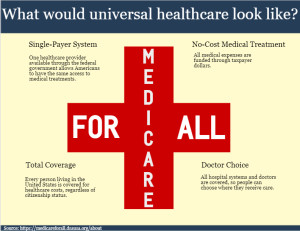By Megan Murphy
Editor-in-Chief
According to the Henry J Kaiser Family Foundation, 44 million “nonelderly Americans” were uninsured in 2013. After the Affordable Care Act (also known as “Obamacare”) went into effect, that number was reduced to around 27 million in 2016.
One of the primary reasons cited for being uninsured was the fact that health insurance costs were still unaffordable for these millions of people. Under a universal healthcare program, however, no one would need to worry about the high cost of medical care or forego needed treatments due to lack of funds. While some people say that implementing a universal healthcare system in the U.S. would be too difficult or raise taxes too much, that is not the case.
“Medicare for all”, as the concept is often called, is entirely achievable and would be beneficial to millions of Americans. 
The United States is the only industrialized country in the world that doesn’t already have universal healthcare. One of the reasons as to why this is would be the cost, which some say would rise under a universal healthcare program. The United States already has some of the highest healthcare costs in the world, with healthcare costs making up 17.6% of the country’s gross domestic product (GDP). Compare that with the rest of the Organisation for Economic Co-operation and Development (OECD), where the average healthcare costs take up about 9.5% of the GDP.
According to John Battista, M.D. of Physicians for a National Health Program (PNHP), healthcare expenses are the primary reason for declaring bankruptcy in the United States. A universal, single payer healthcare program would guarantee coverage for all Americans, regardless of income bracket and ability to pay.
Another problem is many also see universal health care as a far-left, socialist idea. While it’s true that organizations such as the Democratic Socialists of America (DSA) have been leading the call for universal healthcare, a 2017 poll by the Pew Research Center showed that 60% of Americans believe that the federal government should be responsible for their citizens’ health care coverage.
Under a socialized single payer healthcare program, there is good news for these people: through our tax dollars, the federal government would be responsible for all Americans’ healthcare by default.
Even some conservatives see the value of a single-payer healthcare system, such as Chase Madar, in a 2017 article for The American Conservative, stating, “Socializing healthcare is the only demonstrably effective way to control costs and cover everyone.” Not to mention, when Mitt Romney was the governor of Massachusetts, he implemented a form of a universal healthcare program based in that state. In fact, the program was actually a source of inspiration for the ACA in its early stages.
In conclusion, it’s time for the United States to approach healthcare coverage from a different perspective. Many Americans already support the idea of universal healthcare, liberals and conservatives alike.
Despite claims that universal health care would raise the cost of healthcare in America, looking at other countries with universal health care show that the opposite is true. While the transition may take some time, a “Medicare for all” style program can be implemented in the U.S., and would be beneficial to millions of Americans.

Leave a Reply